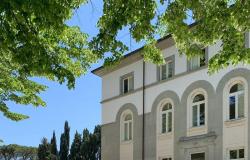“Brotherhood knows no rest”. The life of the Catholic priest and former French partisan Abbe Pierre it (has been) an inexhaustible movement for decades of material help for hundreds of thousands of people who had no means to survive. It is difficult to remember this tenaciously spiritual and profoundly materialistic twentieth-century figure without falling into a generic hagiography of goodness. Director Frederic Tellier with the film L’Abbé Pierre – une vie de combats (in Italian preview in recent days at Biografilm Festival 2024 in Bologna) manages to avoid the holy card, sorry, of the Lyonnais Henri Groues.
The devout Franciscan he became maquis anti-Nazi in the Vercors, cross around his neck and weapons in hand, deputy of the former centrist party MRP in the very first post-war period, finally struck by the path of an absolute charitable message – a roof and food for every destitute – to the point of consuming every personal good and founding theEmmaus association. With today’s shuffled global cards, it is complicated to understand the meaning of the concept of “misery” of the fifties. A society that was emerging from the war and which continued to present devastating class differences to which were added insurmountable housing difficulties also linked to winters that were so harsh at the time that children and adults froze to death on the streets of Paris.
Tellier’s biopic accumulates a few too many nuances of meaning in the first half hour, almost as if theAbbe Pierre still young must immediately show every moral facet, every fold of emotion, every possible sign of an abstract Christology. Then when we arrive at post ’45, after the silence faced with the shooting of a traitor partisan, after having avoided the German bullets, Tellier’s story settles around the bed of a thread stretched deep. It is Abbé Pierre who materializes that hyper-materialist version of his model of liberation theology, that “doing everything for others”, to the point of Franciscan stripping oneself of one’s possessions. Tellier therefore finds in this fifties mist that freezes the bodies, in this peripheral grayness of the roadsides, among those remains of wood, iron and bricks that is the first pioneering site of Emmaus, where all the poor without hope, even the murderers , they find a caress.
The Abbé Pierre (played with raging mysticism, with bony penetration into the flesh by the remarkable Benjamin Lavernhe) thus becomes a sort of pure scourge of wealth, a bolt of lightning that strikes the consciences of the wealthy: those who have so many gifts to those who have nothing should do so immediately. The religious man does not stop at anything, he does not stop at ministers and he does not even stop at the possibility of communicating his beliefs through the potential – we are in the fifties – of the radio. “The brother of the poor”, “the provocateur of peace” gradually occupies the entire picture, the entire narrative. When even an already mature one Charlie Chaplin meets him to give him an astronomical sum addressed to Emmaus recalling his origins as a “vagrant”, Abbè Pierre does not have the slightest deviation, he does not get excited even for an instant beyond the spiritual and material mission of his existence on earth, concentrating relentlessly on a sort of apostolate of word (his speeches are indelible traces of French history), surrounded by desperate and redeemed disciples, as well as by the faithful Lucie Coutaz (interpeated by the director Emmanuelle Bercot), also a partisan, all-round co-founder of Emmaus for fifty years.
“It was a great pleasure to impersonate a hero with his theatrical way of acting and transmitting his message of struggle, extending his words to today to provoke consciences and not lower our eyes in the face of poverty,” explained the protagonist Lavherne during the press meeting at Biografilm. “Abbé Pierre was both a light and a beating heart in times of storm and demonstrated that life is stronger than any difficulty. For me, however, the greatest difficulty in interpreting him was precisely to evoke him and not copy him, to convey the emotions of his speeches”. Abbè Pierre died at the age of 94 in 2007, leaving a vast and well-established network of solidarity and help for the poor, always under the banner of Emmaus.







